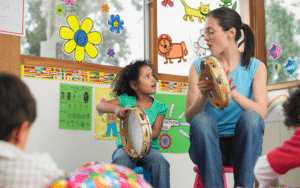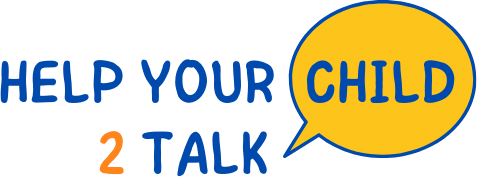Music is an integral part of most cultures, resonating with both the young and old alike. For parents aiming to give their children a developmental advantage, understanding the profound effects of music on a child’s speech, language, and overall communication development can be illuminating. In this article, we’ll answer the question, “Can music help communication development?” We will also delve into the nuanced relationship between music and a child’s developmental journey.
The Connection Between Music and Speech Development
From a young age, children are exposed to rhythm, pitch, and melody, all fundamental components of music. This exposure indirectly aids in the development of their speech and language skills.

- Rhythm and Timing: Just as syllables and words have a distinct rhythm in sentences, musical beats provide an inherent sense of timing. When children tap, clap, or move to a beat, they’re honing their ability to detect and replicate rhythmic patterns, a crucial skill in speech development.
- Pitch Recognition: Exposure to the variance in pitch in music helps children learn to distinguish between different speech sounds, enhancing their phonemic awareness. For instance, the difference in intonation when asking a question versus making a statement is analogous to the pitch variations in music.
- Speech Sound Production: Singing along to songs can help children produce speech sounds and articulate more clearly.
- Sound Sequencing: Following the melody of a song aids children in understanding the sequence of sounds, which translates into understanding and producing the sequencing of sounds in words, phrases, and sentences.
- Word Production: Repetitive song lyrics enable children to experiment with and practice word production, making it easier to articulate and remember words.
- Production of Phrases and Sentences: Singing full lines of a song encourages children to produce longer phrases and sentences, enhancing their speech production and expressive language skills.
How Music Enhances Language and Vocabulary
Songs are a treasure trove of new words and concepts for young minds. Children’s songs, especially, are often repetitive, catchy and paired with gestures, making it easier for them to:
- Expand Vocabulary: Songs introduce children to new words and their meanings, widening their vocabulary.
- Understand Context: Listening to lyrics helps children understand the context in which words are used, facilitating a deeper comprehension of language.

Boosting Communication Skills Through Music
Music fosters emotional expression and understanding: These skills are foundational for effective communication.
Emotional Expression: Through songs, children learn to identify and express their feelings, from happiness and excitement to sadness and frustration.
Active Listening: Listening to music cultivates an attentiveness that transfers to everyday communication, teaching children the importance of listening, anticipating, taking turns, and understanding.
Social-Emotional Benefits of Music
Music has an undeniable influence on our emotions and social interactions, and these effects are especially profound in children.
- Emotional Regulation: Music can act as a tool for children to regulate and manage their emotions. It can help them to calm down during periods of distress or energize during moments of lethargy.
- Social Bonding: Group musical activities promote teamwork and foster a sense of belonging.
- Empathy Development: Lyrics often tell stories, enabling children to understand different perspectives and build empathy.
- Boosting Self-Esteem: Mastering a new song or a musical instrument can provide a sense of accomplishment, bolstering a child’s confidence.

Incorporating Music into Your Child’s Routine
- Singing Together: From lullabies to nursery rhymes, singing with your child is a fun and effective way to enhance their language development.
- Listening to music: Exposing your child to a variety of music throughout their daily routines gives them a rich auditory experience.
- Musical Games: Games like “Freeze Dance” or “Musical Chairs” encourage listening skills, anticipation, and action.
- Learning Instruments: Playing an instrument improves hand-eye coordination, focus, patience, and so much more.
FAQs
- Is any music genre better for child development?
- While classical music often gets highlighted, what’s most important is exposing children to a variety of musical genres. This broadens their auditory experiences.
- How early should I introduce music to my child?
- It’s never too early! Even babies in the womb respond to music.
- My child isn’t showing interest in music. Should I be concerned?
- Every child is unique. While some might naturally gravitate towards music, others might find interest elsewhere. It’s important to find what resonates with your child and discover ways to modify their musical experience to make it enjoyable.
- Can music help children with speech delays?
- Yes, music is very effective in aiding children with speech, language, and communication challenges.
- Is it beneficial to play background music throughout the day?
- Moderate exposure is beneficial, but it’s also essential to have quiet moments, allowing children to focus on other auditory and sensory stimuli.
- Can music improve my child’s academic performance?
- Research suggests that children involved in music tend to perform better academically. However, it’s just one of many factors contributing to academic success.
Further Reading
- The Impact of Music on Cognitive Development in Children… (growing-sound.com)
- The Positive Influence of Playing Music on Youth | NAMM Foundation
- Learn How Music Helps Your Child Develop Intelligence and Key Skills (centerformusicalarts.org)
- Baby music: The soundtrack to your child’s development | UNICEF Parenting
- Literacy Through Music: Communication | Learning and Development | Teach Early Years
Summary/Conclusion
Can music help speech, language, and communication development? Yes! The intersection of music, speech, language, and communication growth in child development is profound. Through exposure to diverse music listening experiences, movement, and hands-on musical experiences, children can not only gain auditory benefits but also enhance their active listening skills, understanding of language, language expression, speech sound production, social-emotional development, mood, and overall well-being. As parents, integrating music into daily routines and being mindful of its potential impact on your child’s life can play a pivotal role in fostering speech, language, communication, and overall development.




0 Comments